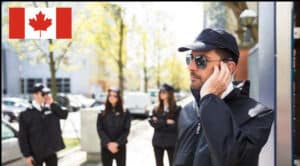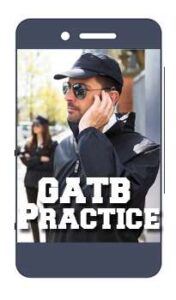General Aptitude Test Battery GATB Practice Test Questions
- Posted by Brian Stocker
- Date April 2, 2020
- Comments 1 comment
Canadian Police

About the Test
The Canadian GATB is a test used in careers as security, special constables, TTC officer, or nuclear security in Ontario. This test of the process of recruitment that helps in assessing the candidate’s general aptitude. This test is offered by the Ontario Applicant Testing Services. It is specially designed to measure the candidate’s spatial aptitude, problem-solving ability, vocabulary, and basic math.
GATB is also used by transit commissions, police forces, and other firms in Ontario to assess and ensure entry-level recruits meet their core competencies.
Whats on the General Aptitude Test Battery
The GATB has 4 sections:
- Basic Math
- Vocabulary
- Spatial Relations – Folding
- Problem Solving
How to Become a Security Guard in Canada – The Complete Guide
Occupations that use the GATB
- Toronto Transit Special Constable
- Airport Special Constable
- Barrie Police
- Parking Enforcement
- AECL Nuclear Security
- Toronto Traffic Control Constable
- Court Prisoner Security Officer
- Go Transit Safety Officer
- Ontario Provincial Police
- London Police Service Court Prisoner Security Officer
- York Court Security Officer
Salaries and Occupational Outlook
Toronto Police
Average Salary: $76,144
PEEL Regional Police Officer
Average Salary: $73,203
Occupational Outlook
Demand for police officers is expected to grow at about the average for all occupations, around 5% 2018 to 2028. Public safety is ongoing and will not diminish. Demand for police officers and security officers varies by location.
General Aptitude Test Battery Practice Questions
Basic Math and Problem Solving
Basic math and problem solving skills are essential for performing a wide range of tasks that require analytical thinking and problem-solving abilities, such as:
Analyzing crime scenes. Police officers and security personnel need to analyze crime scenes to collect and evaluate evidence. Basic math skills such as geometry are used to determine the size, shape, and location of objects.
Traffic management. Police officers need to manage traffic flow and ensure public safety on roads and highways. Basic math skills help officers calculate distances, speeds, and travel times.
Risk assessment. Security personnel use basic math and problem solving skills to identify and assess potential risks, threats and vulnerabilities and make informed decisions about security measures in various settings such as airports, government buildings, and public events.
Emergency response. Police officers and security personnel need to respond quickly and effectively in emergency situations. Basic math and problem-solving skills enable officers to analyze situations, evaluate risks, and determine the best course of action.
Basic Math and Problem Solving Questions on the GATB include:
- Basic number operations such as divide [÷], multiply [x], subtract [-], and add [+] \
- whole numbers
- fractions
- decimals
- percentages
Basic Math Practice
Basic Math – 10 questions
Basic Math 2 – 10 questions
Word Problems – (Problem Solving)
Word Problem Tutorial
Algebra – 7 questions
Percent – 18 questions
Fractions, Percent and Decimals – 14 questions
Vocabulary
Vocabulary is an essential aspect of communication in any profession, and this is especially true for security and police personnel.
Writing Reports. Police and security guards and related personnel need to write clear and concise reports that accurately describe incidents and document evidence. A strong vocabulary help officers use precise language and avoid ambiguity.
Interviewing. Police officers and security personnel interview witnesses and suspects to gather information about a variety of incidents. A large vocabulary help officers ask clear and precise questions and understand responses.
Communicating. Security and police personnel communicate with the general public in different situations such as traffic stops, crowd control, and emergency response. A good vocabulary is important to convey information clearly and effectively so your message or instructions are understood.
Legal and technical. Security and police personnel need to understand legal terminology and procedures, which often involve complex vocabulary.
Training. Security and police personnel often need to provide training and education to other officers and the public. Officers and personnel must convey complex concepts in simple and understandable terms to ensure others understand the material.
Vocabulary Questions Include:
- Synonyms
- Antonyms
Vocabulary Practice
Get Ready for the GATB
Online Course with FREE Quiz — Study Guide PDF Download — Paperback (Amazon)
Spatial Relations – Folding
Spatial relations is an important cognitive skill for security and police personnel
Crime scenes. Police officers and security personnel need to investigate crime scenes, collect evidence, and reconstruct the events. Spatial relations skills help officers to understand the layout of the crime scene, to identify relevant objects and locations, and to reconstruct the sequence of events accurately.
Navigation and orientation. Police officers and security personnel need to navigate physical spaces effectively and efficiently, for example, responding to an emergency or patrolling a large area. Spatial relations skills help officers to understand the layout of the area, to navigate using maps and other tools, and to orient themselves quickly in an unfamiliar environment.
Traffic management. Police officers and often security personnel need to manage traffic flow, anticipate patterns and congestion.
Crowd control. Security and police personnel need to manage crowds in various situations such as public events and demonstrations, anticipate potential conflicts.
Building security. Security personnel need to understand the layout of buildings, navigate effectively to monitor access points and respond to emergencies.
Folding Practice
The General Aptitude Test Battery (GATB) is a standardized test that measures an individual's general ability in a variety of areas. It is designed to assess a person's potential for success in different types of jobs.
The GATB test measures aptitude in, verbal ability, numerical ability, spatial ability, perceptual ability, mechanical ability, language ability, and clerical ability.
The GATB test takes approximately three and a half hours to complete.
The GATB test is typically administered in a proctored testing environment. It can be taken in paper-and-pencil format or on a computer, depending on the testing center.
There is no passing or failing score for the GATB. The test is designed to measure a person's aptitude, so the scores are used to help determine the types of jobs that the individual may be well-suited for.
Studying the topics that are covered, taking practice tests, and familiarizing yourself with the test format. This is a multiple choice test - help with multiple choice
Yes, you can retake the GATB test. However, there is a wait period of three months. The wait period could be longer hover, depending on the testing center and employer policies.
The scores are used by employers, vocational counselors, and other professionals to determine the types of jobs that you are best suited for.
GATB test scores are valid for 3 years.
Common Misconceptions about the GATB Test
The GATB test is an IQ test: They are similar but not the same. The GATB test measures an individual’s aptitude in various areas, but it is not an IQ test. IQ tests are designed to measure intelligence, while the GATB test is designed to measure a person’s potential for success in different types of jobs.
The GATB test is pass/fail: There is no passing or failing score. The test is designed to measure an individual’s aptitude in various areas, and the scores are used to help determine the types of jobs that the individual is best suited.
The GATB test is only for entry-level jobs: While the GATB test is often used for entry-level jobs, it can also be used for mid-level and even some senior-level positions. The test is designed to determine an individual’s potential for success in a job, regardless of the level of the position.
The GATB test is biased: The GATB test is designed to be fair and unbiased. The test questions are reviewed by subject matter experts to ensure that they are free from cultural or gender biases.
The GATB test is easy to cheat on: Cheating on the GATB test is difficult because the test is typically administered in a proctored testing environment. Additionally, the questions on the test are randomized, so no two tests are exactly the same.
The GATB test scores are the only factor in getting a job: While test scores are an important factor, they are not the only one. Employers may also consider an individual’s experience, education, and other qualifications when making hiring decisions.
GATB Study HELP
General Aptitude Test Battery Study Practice Course
Timed Tests, quizzes, self assessments, tutorials how to take a test and more
Online Course with FREE Quiz
Paperback (Amazon)
Date Published: Thursday, April 2nd, 2020
Date Modified: Monday, April 29th, 2024
Got a Question? Email me anytime - Brian@test-preparation.ca
You may also like
CBSA OTEE Client Service Practice Questions
OTEE Client service questions are designed to assess an individual’s ability to interact effectively and professionally with clients, customers, or the public. These questions evaluate skills such as empathy, active listening, problem-solving, and communication. The goal is to determine how …
Prioritizing Tasks
Explanations Summary Urgent/Important: Requires immediate action due to security concerns. Urgent/Not Important: Needs timely attention but does not impact broader security or operational duties. Not urgent/Important: Important for records and accountability but can be addressed after urgent matters. Not urgent/Important: …
Hard Algebra Questions
Advanced Algebra Practice 1. Simplify expressions with radicals and rational exponents using properties of exponents A = 22a – 2 and B = 53 – 2a are given. Find the value of 404a – 2 in terms of A and …


1 Comment
This seems a bit extreme for someone who has applied to Canada Post for a part time on call temporary position ♀️, but ok then.